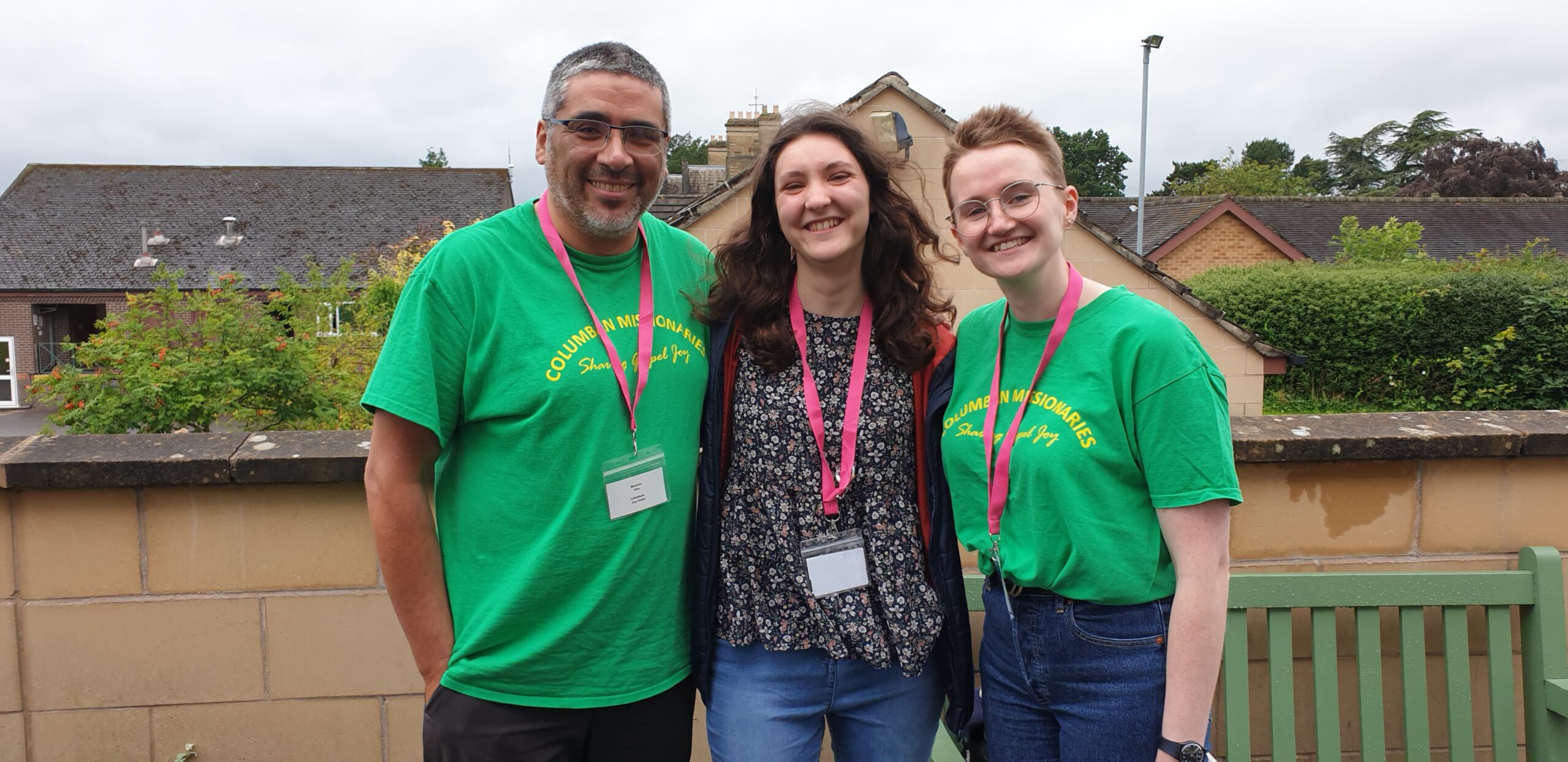The Justice and Peace Network “is needed more than ever before” a former British Minister of State at the Foreign Office and Labour MP told participants attending the annual National Justice & Peace Network conference in Derbyshire. Sarah Mac Donald, Editor of the Far East magazine, attended the conference on behalf of the Columbans in Ireland.
The 2023 NJPN conference gathered Justice and Peace campaigners to discuss the theme: ‘Sustainability? Survival or Shutdown’.
The overall message of the conference was hope. Participants were urged to bring hope by advocating back in their dioceses for the political will to take human rights and sustainability more seriously. Columban Missionaries in Britain are one of the sponsors of the conference.
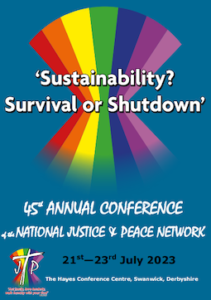 In a talk entitled, ‘Advocacy and Faith Action’, Sir John Battle, an NJPN patron and activist with Leeds Justice and Peace commission said, “We need to shift from charitable action to challenging the causes of injustice in line with the preferential option for the poor.”
In a talk entitled, ‘Advocacy and Faith Action’, Sir John Battle, an NJPN patron and activist with Leeds Justice and Peace commission said, “We need to shift from charitable action to challenging the causes of injustice in line with the preferential option for the poor.”
The 45th annual conference addressed issues crucial to the common good and the well-being of the natural world, with a particular focus on the United Nations Sustainable Development Goals (SDGs).
Commitments at the end included lobbying politicians and leaders in general, involving the Bishops’ Conference, to remind the governments of their promises in terms of the SDG goals. “No new oil, coal and gas” was another call and a promise to live more simply as individuals and in our communities.
Over 21-23 July, up to 150 participants, including Justice and Peace activists from 16 dioceses and from National Justice and Peace Scotland, priests from three missionary societies and six orders of religious sisters joined representatives of CAFOD, CSAN, CARJ, Missio, Pax Christi England and Wales, SVP, Archbishop Romero Trust and the Laudato Si Movement to highlight social justice issues, structural injustice, climate change, conflict, and migration.
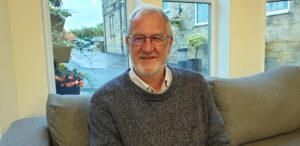
Sir John Battle. Photo: Sarah Mac Donald
In his talk, Sir John Battle warned participants, “There has been a fundamental undermining of the common good, which with the dignity of the person is at the heart of our social teaching.”
He suggested the best way to respond to these signs of the times of the political culture were Pope Francis’ encyclicals, Laudato Si, On Care for Our Common Home, and Fratelli Tutti on Social Friendship, which sets out the Pope’s vision for interpersonal relational building through listening to people and making sure that politics is in touch with the realities of the people, starting with the poor.
“I want to suggest you is that we bind these two volumes together and use them as our workbook all the time. Why? Because at present we face a division between care for the earth and care for the poor. The talk is starting to divide between those that are poor, and those that want to look after the environment and can afford to do so.”
Elsewhere in his address, the former Labour MP called on the Church to take risks rather than being occupied with “softly whispered backroom lobbying”.
“It is not enough for our bishops to say, ‘can we support the common good?’. We need consistent and sustained advocacy action,” he stressed.
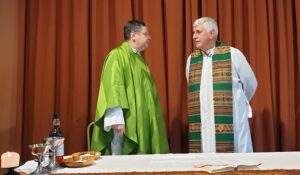
Fr Dominic Robinson SJ (left) and Columban missionary Fr Ed O’Connell. Photo: Sarah Mac Donald
Mass was concelebrated by Columban missionary Fr Ed O’Connell and the main celebrant was Jesuit Fr Dominic Robinson.
“Work for justice is part of preaching the Gospel,” Christine Allen, Executive Director of CAFOD said in her presentation in which she was interviewed by Columban Education and JPIC Coordinator, James Trewby.
Christine Allen works closely with partners around the world, putting the SDGs into practice.
A video was played of partner Caritas Brazil, which was founded by Dom Helder Camara, which embraces the SDG principle of ‘leave no one behind’. Caritas Brazil works to tackle social injustice and defend indigenous populations, “who are the primary guardians of forests and rivers,” and promotes the rights of nature as well as human rights.
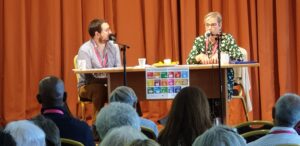
Christine Allen of Cafod speaking to James Trewby of the Columbans. Photo: NJPN
Christine Allen also gave examples of CAFOD’s work with partners in drought stricken Marsabit, Northern Kenya and in DR Congo with victims of sexual violence in the context of conflict.
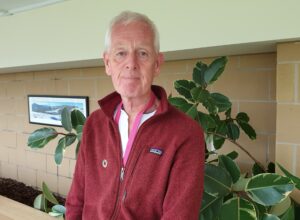
Brian O’Toole, Director of the Presentation Sisters Justice Desk for Ireland and England. Photo: Sarah Mac Donald
In another presentation, Brian O’Toole, Director of the Presentation Sisters Justice Desk for Ireland and England, said the Presentation Sisters globally are committed “to respond to ‘the cry of the Earth and to people kept poor’ and are doing this by embracing the SDGs in a human rights framework, addressing such issues as women and children, care of creation and indigenous peoples.”
Of the 12 workshops, Columban Missionaries explored responses to people seeking asylum in the UK in the light of the Illegal Immigration Bill.
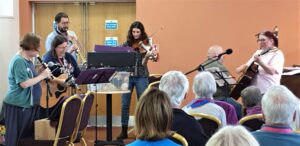 Westminster J&P introduced materials for bring the Season of Creation into the life of parishes and schools. Other workshops included, ‘Farming in the Future’, ‘How can we answer Pope Francis’s call to live more simply’, and ‘Being peacemakers in time of war’.
Westminster J&P introduced materials for bring the Season of Creation into the life of parishes and schools. Other workshops included, ‘Farming in the Future’, ‘How can we answer Pope Francis’s call to live more simply’, and ‘Being peacemakers in time of war’.
Fr Joshtrom Isaac Kureethadam of the Vatican’s Dicastery for Promoting Integral Human Development sent a video message to the conference urging participants to promote the SDGs and the Laudato Si Action Platform. “May justice and peace embrace so that the life of all can flourish,” he said.
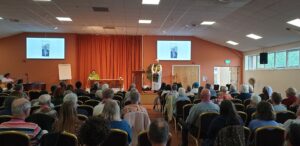 Tomas Insua of the Laudato Si Movement in Assisi said in a second video message that, “the cry of the poor and the cry of the Earth are deeply connected, and I hope this gathering motivates action for our common home, particularly during the Season of Creation in the Autumn.”
Tomas Insua of the Laudato Si Movement in Assisi said in a second video message that, “the cry of the poor and the cry of the Earth are deeply connected, and I hope this gathering motivates action for our common home, particularly during the Season of Creation in the Autumn.”
Columban co-worker, Mauricio Silva, who is Interreligious Dialogue Coordinator for the Columbans in Britain co-hosted one of the workshops at the NJPN conference with Catherine Bridgwood, a former Faith in Action Volunteer with the Columbans, who currently works for Restore (Birmingham Churches Together Supporting Refugees) as the Befriending Coordinator.
Mauricio told Columbans.ie, “The workshop was very well attended and received by the participants. It was entitled ‘A Preferential Option for the Refugee’.”
“We started with an exercise around the issue of language and labels of refugees, so the participants would choose words that they would be either comfortable or uncomfortable with while speaking about refugees. The summary is that refugees and people on the move are just people, like we are.”
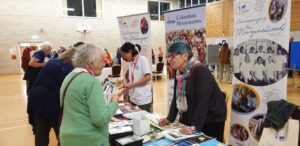 “Then we gave them an overview of the importance of the 1951 Refugee Convention, particularly in light of the erosion of refugee rights/sanctuary that is happening in the UK with the new Illegal Migration Act. We looked at the latest statistics of the UNHCR (2022) which is a good summary of where we are.”
“Then we gave them an overview of the importance of the 1951 Refugee Convention, particularly in light of the erosion of refugee rights/sanctuary that is happening in the UK with the new Illegal Migration Act. We looked at the latest statistics of the UNHCR (2022) which is a good summary of where we are.”
“The second part of the workshop was an invitation to reflect on how Christians are invited today to make preferential option for the refugee, following a similar theological journey as the journey of the preferential option for the poor started in Latin-American in the 70s.”
“Then, we shared ideas about what this preferential option would look like in our communities: welcoming, advocacy, campaigning, etc. We both shared with the 25 participants about Restore and Fatima House as examples of what a preferential option for the refugee looks like.”
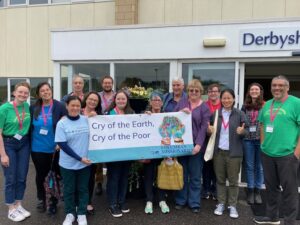 Situated close to the centre of Birmingham, Fatima House is operated by the Archdiocese of Birmingham Archdiocese and the Columbans offering shelter to women asylum seekers.
Situated close to the centre of Birmingham, Fatima House is operated by the Archdiocese of Birmingham Archdiocese and the Columbans offering shelter to women asylum seekers.
Recordings of this year’s NJPN conference can be heard here: www.justice-and-peace.org.uk

